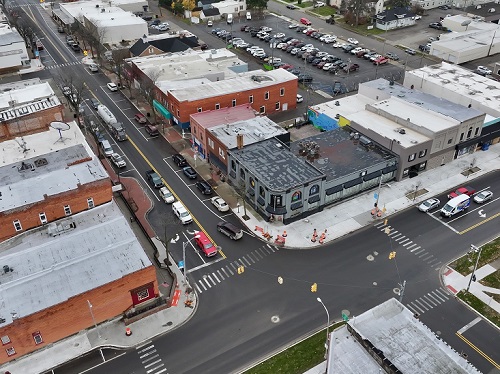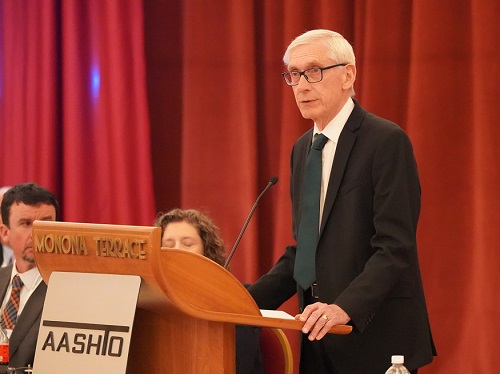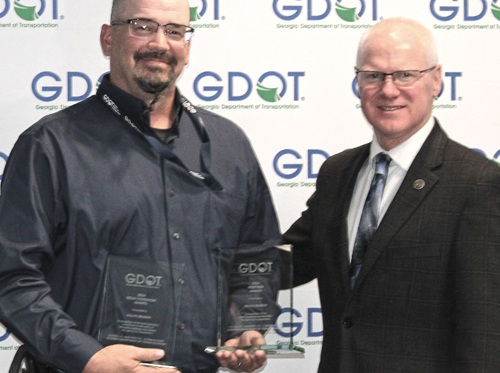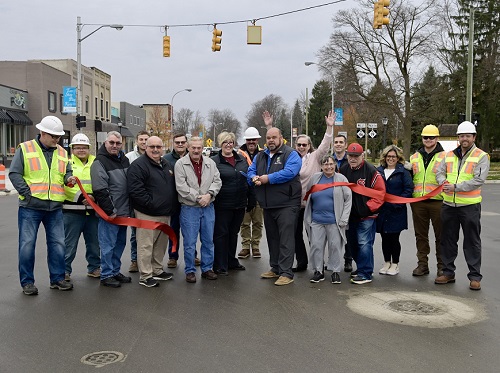The Michigan Department of Transportation recently held an event with the City of Sandusky to celebrate the reopening of M-46 and M-19 roadways, which support commercial, commuter, and tourism traffic for that municipality.
[Above photo by Michigan DOT]
This $26.4 million project included rebuilding M-46 in the city of Sandusky, replacing storm sewers, upgrading traffic signals, replacing curbs, upgrading sidewalks, and safety improvements, as well as improving M-19 in the city of Sandusky.
The agency also coordinated with the city’s water main improvements project as part of this roadway revitalization effort and next expects to begin work on resurfacing M-46 from the Sandusky east city limit to the Carsonville west village limit; a project expected to be completed by November 2025.

“I know it was a lot for the community to handle during construction, it was pretty impactful to their main routes through town,” said John DeLang, Michigan DOT transportation engineer, in a statement. “But now that it’s complete, we’re hoping that it’ll last a long time before we have to come back and touch it. Everyone we’ve talked to has been pretty happy with how it turned out and they’re excited to see the new road going into Sandusky.”
“It’s huge for our community,” said Sandusky Manager David Faber in a statement. “It’s a reinvestment in our downtown. These roads have been here for a long time and they needed to be redone. We hope this project is a catalyst for our downtown, our redevelopment and bringing everyone to Sandusky.”
Other state departments of transportation are also currently engaged in a range of locally-focused road projects.
For example, Governor Tony Evers (D) and the Wisconsin Department of Transportation recently awarded a $500,000 Transportation Economic Assistance or TEA grant to the city of Milton to help improve 2,700 feet of Vickerman Road to increase vehicle accessibility and allow material science company Charter Next Generation to add a second facility in the city.
Wisconsin DOT added that the project will widen Vickerman Road to allow for safe and efficient truck access to the new facility. The road improvements will also enhance accessibility for businesses and increase capacity to accommodate further growth and development to the area.
Once the upgrades are complete, Vickerman Road will be classified as a Class A Truck Route, allowing for heavier loads going to and from the facility, the agency said.

“Infrastructure upgrades through our TEA grant program have a direct impact on Wisconsin’s economy and the quality of life in our communities,” the governor said in a statement. “This investment in the City of Milton will not only improve a local road but it will lead to more economic opportunity in the region.”
“This project demonstrates exactly what the TEA grant program is about,” added Kristina Boardman, Wisconsin DOT secretary. “We welcome opportunities to work with communities across the state to make necessary improvements to support economic growth.”
Meanwhile, the Massachusetts Department of Transportation recently awarded more than $4.5 million to 11 municipalities as part of the first round of fiscal year 2025 grants via its Complete Streets Funding Program.
The agency said that those grants will fund local multimodal infrastructure projects that improve travel for pedestrians, public transit users, bicyclists and people using other forms of transportation.
MassDOT added that its Complete Streets Funding Program – launched in 2016 – provides technical assistance and construction funding to eligible municipalities to plan and implement Complete Streets. Prior to this round of disbursements, the program had awarded 278 construction project grants across the state worth more than $100 million in total.
The Ohio Department of Transportation also recently issued $63 million to projects aimed at improving roadway safety at the local level across 14 counties, along with more than $12 million to help fix or replace several local bridges.
That $63 million, issued from Ohio DOT’s Highway Safety Improvement Program, will support 19 safety projects, including the construction of a dozen roundabouts and the installation of several cable barriers.
And in October, Alabama Governor Kay Ivey (R) awarded $3.1 million in state funding to cities and counties statewide to support various road and bridge projects; funding that comes from the Rebuild Alabama Act passed by the state legislature and signed by the governor in 2019.
The Rebuild Alabama Act required the Alabama Department of Transportation to establish an annual road funding grant program that sets aside a minimum of $10 million off the top of the state’s share of new fuel tax revenue for local projects.
Of the awarded projects, cities and counties also contributed $1.4 million in local matching funds. The Alabama DOT noted that all projects receiving grants through the Rebuild Alabama Act are required to move forward within one year of the awarding of funds.
 States
States
Georgia DOT Foreman Receives Two Heroism Awards
January 2, 2026 States
States

